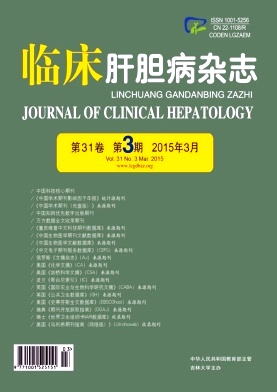Objective To investigate the clinical value of nucleotide analogues for the treatment of hepatitis B- related decompensated cirrhosis. Methods A total of 97 inpatients with hepatitis B- induced decompensated cirrhosis were selected from the Department of Hepatology,Nanhua Hospital,Shanghai,China,from January 2007 to December 2013. There were 55 patients of the antiviral group and 42 patients of the non- antiviral group. Each group was subdivided into groups 1( hepatitis B- related cirrhosis) and 2( hepatitis B- related liver cancer). The antiviral group 2 was further divided into groups 2. 1( antiviral therapy before detection of liver cancer) and 2. 2( antiviral therapy after detection of liver cancer). According to the period of time for antiviral therapy,patients were divided into groups A( ≤24weeks),B( 24- 48 weeks),and C( > 48 weeks). Courses of hepatitis,cirrhosis,and cancer,as well as survival rate and complication incidence,were compared between groups. Continuous data were expressed as the mean ± standard deviation,for which pairwise comparisons were performed using t test and multiple comparisons were performed using one- way ANOVA. Categorical data were expressed as percentage,for which group comparisons were performed using χ2test. Results There were no significant differences between the antiviral and non- antiviral groups regarding course of hepatitis,complication incidence,and 7- year and 9- year survival rates( P > 0. 05). Significant differences existed between the above two groups in course of cirrhosis,53. 27 ± 58. 16 months vs 30. 76 ± 46. 70 months( P < 0. 05); and 3- year and 5- year survival rates,58. 2% and 36. 4% vs 33. 3% and 16. 7%( P < 0. 05). Additionally,course of liver cancer significantly differed between the antiviral groups 2. 1 and 2. 2,3. 93 ± 3. 39 months vs 21. 58 ± 23. 20 months( P < 0. 05). There were no significant differences between groups A,B,and C regarding course of hepatitis,complication incidence,and 9- year survival rate( P > 0. 05). The above three groups of patients showed significant differences in course of cirrhosis,32. 75 ± 61. 32 months vs 25. 86 ± 16. 40 months vs.74. 79 ± 55. 40 months( P < 0. 05); course of hepatitis B- related liver cancer,2. 55 ± 2. 72 months vs 10. 43 ± 7. 25 months vs 17. 71 ±24. 21 months( P < 0. 05); and 3- year,5- year,and 7- year survival rates,( 35. 0%,15. 0%,and 5. 0%) vs( 42. 9%,14. 3%,and14. 3%) vs( 78. 6%,60. 7%,and 35. 7%)( P < 0. 05). Conclusion Antiviral therapy for hepatitis B- related decompensated cirrhosis can prolong the survival time and increase the 3- year and 5- year survival rates in patients with liver cirrhosis and cancer. The curative effect becomes more significant with antiviral therapy over a longer period of time.







 DownLoad:
DownLoad: